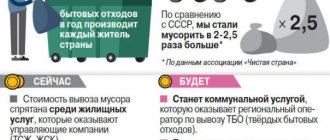Who should pay for garbage removal: the owner or the tenant?
The owner of the premises is obliged to enter into an agreement with the regional operator.
The answer to this question can be found in Decree of the Russian government dated November 12, 2016 No. 1156. It states that in buildings, structures and other non-residential premises, the obligation to enter into an agreement with a regional operator for waste removal lies with the owner . An alternative is a person who officially represents the interests of the owner.
In practice, it can be difficult to implement a tenant-operator agreement. For example, if there are 200 offices in a building, and each one is rented to an individual, instead of one waste management agreement, 200 will have to be concluded.
Options for fraud on the part of the management company
Currently, 2 variants of fraud against citizens have been identified:
- For many people, the payment for garbage was included as a separate line in their housing and communal services receipts and they also received separate bills for solid waste - as a result, citizens had to pay for garbage twice;
- Also, in a number of regions, utility bills were significantly higher than the approved tariffs (they can be viewed on the RO website).
Legitimate advice: carefully check payment documents and if you find double payments or their excessiveness, first contact the Regional Operator with a complaint; in case of refusal, you must go to court.
Should individual entrepreneurs pay for garbage removal?
Like other individuals or legal entities, individual entrepreneurs are responsible for the removal and disposal of waste. An entrepreneur can do this independently, if we are talking about non-hazardous municipal solid waste (MSW), or through a regional MSW operator, having concluded an agreement with him.
For reference! For the absence of an agreement with the operator, the individual entrepreneur may be held administratively liable under Article 6.3. Code of Administrative Offenses of the Russian Federation, the activities of an enterprise in some cases are suspended for up to 3 months.
Tariffs for individual entrepreneurs for waste management are commercial. If an entrepreneur is personally involved in the removal of solid waste, he is obliged to maintain accounting documentation for reporting. It is presented during inspections by regulatory authorities, in particular to the inspector of Rospotrebnadzor.
Should summer residents pay for garbage removal?
They definitely should, but at reduced rates.
They definitely should. Despite the fact that, in fact, summer residents do not live permanently on their plots, are not registered in them, and sometimes visit, they are required to pay for garbage removal. At the same time, they have a reduced tariff, which amounts to 300-500 rubles. per year, depending on the region.
Summer residents can recalculate at the place of registration on the basis that they paid part of the payment for the removal of the garbage they generate at their dacha. The recalculation is carried out personally in relation to one family member for whom the country plot is registered. For others it remains unchanged.
What does Sberbank have to do with it?
The interest in the problem of collection of payments in Gref’s letter is explained by the fact that Sberbank “promotes the creation of a sustainable system for the management of municipal solid waste” and has already approved financing of five projects for the construction of waste processing complexes totaling 14 billion rubles. For example, at the end of 2019, the Spanish waste management operator Urbaser, together with the Russian Direct Investment Fund (RDIF) and several other investors, agreed to invest up to RUB 2.9 billion. to a waste sorting and disposal complex in the Kaliningrad region. Sberbank confirmed its readiness to participate in this project, said RDIF First Deputy General Director Tagir Sitdekov.
Sberbank has already invested about 10 billion rubles. in the construction of RT-Invest waste processing complexes in the Kolomensky, Kashira and Sergiev Posad districts of the Moscow region, a representative of RT-Invest told RBC.
A consortium of RDIF and the Spanish Urbaser will sort waste in Russia Business
The initiative to include payments for waste removal in a single payment system will “significantly” increase the investment attractiveness of the industry for private investment and will multiply the construction of new capacities for processing, neutralization and disposal of waste, Gref concludes.
But Sberbank will be able to earn not only from increasing the investment attractiveness of the industry, but also directly from increasing the collection of payments for housing and communal services and municipal waste. According to the Rossiya Association of Banks, banks occupy about 70% of the market for accepting payments for housing and communal services, and the largest share falls on Sberbank: through its application or branches you can pay for electricity, water supply, gas, municipal waste, etc. According to the head of the payment acceptance company for Alexei Zaikov, in some territories Sberbank accepts up to 30–70% of such payments.
How much does Sberbank earn on commissions?
The utility fee is charged either to the payer, if the bank does not have an agreement with the housing and communal services provider, or to such a company. The average commission paid by an individual or company is about 0.4%. The highest commissions may be when paying for services in cash through bank cash desks in hard-to-reach and sparsely populated areas. At Sberbank, commissions for individuals vary depending on the region: for example, at the Moscow territorial bank they range from 0.5 to 3% (minimum 25 rubles).
For the first half of 2021, Sberbank's net commission income (according to Russian accounting rules) amounted to RUB 227.5 billion. The bank does not allocate fees for the provision of services for accepting payments for housing and communal services in a separate column. In total, according to the Unified Interdepartmental Information Statistical System, in January-June of this year, Russians paid 634.9 billion rubles for housing and communal services, major repairs and residential premises. According to BKF bank analyst Maxim Osadchy, Sberbank’s income from this activity could amount to 1–2 billion rubles. for the first half of the year. For comparison, Sberbank earned 31 billion rubles from commissions for money transfers over the same period. A bank representative declined to comment on this topic.
If the fee for the waste removal service is included in a single payment document everywhere, then the money will first go to a single transit account and then be distributed among companies, notes Natalya Belyaeva, deputy head of the committee for waste processing and secondary resources of Business Russia. Thus, Sberbank will be able to earn not only from commissions for accepting payments, but also from storing money in this account and servicing it, the expert adds.
Preferential categories
Those eligible for benefits will be able to pay less for waste removal. Since this payment is included in utilities, the benefit is automatically calculated for the entire payment amount.
Preferential categories include:
- Families with three or more children (large families);
- Disabled people of the first two groups;
- Veterans of the Great Patriotic War, labor;
- Participants in hostilities;
- Persons who passed through the siege of Leningrad;
- Victims of political repression.
Benefits are provided both personal and for family members, depending on the category. Some are completely exempt from paying for waste management.
Should a pensioner pay for garbage?
Not all categories of pensioners are required to pay for the removal of MSW.
Retired persons are entitled to benefits for the service in question only if they do not work. Those under 70 years old pay 30% of the cost of the service. From 70 to 80 years of age - 50%, and from 80 years of age are fully exempt.
In some regions, such as the Moscow region, the work requirement was abolished. These benefits apply to all pensioners, including working ones.
Should families with many children pay for garbage?
Yes, they should.
In some regions, such as the Tula, Tver regions, Orenburg, etc. By decision of local authorities, large families are exempted from having to pay for waste management services. In general, the trend is aimed at completely exempting such families from paying for garbage collection in the Russian Federation. But for now, as a general rule, a 30% discount applies to them.
Should children pay for trash?
Yes, they should.
Children often litter more than adults. The point is that children are also charged a fee for waste management. There is a proposal not to do this for minors who are under 14 years old. But opponents point out that everyone litters. And families with small children generate even more solid waste than others.
Who shouldn't pay for garbage removal?
WWII veterans are exempt from paying for garbage removal.
As stated above, pensioners over the age of 80 are completely exempt from paying for the removal of solid waste. In addition, some regions went further and completely exempted the following categories from this obligation:
- Disabled people of the first group;
- WWII veterans;
- Large families;
- Home front workers
- Persons who suffered from repressions, prisoners of concentration camps;
- Persons who survived the siege of Leningrad;
- Heroes of the Soviet Union and Socialist Labor;
- Full Knights of the Order of Glory.
The benefit is provided to them either personally or to family members, as in the Novosibirsk region. In any case, information must be clarified at your place of residence.
Composition of the MSW management service
The innovation is fundamentally different from the way waste removal services were provided previously. Taking into account the policy of preserving the environment, the RO is obliged to:
- Collect waste from all containers for which a fee is paid, including from the private sector;
- Perform waste sorting. All solid waste (MSW) is divided into 4 main groups, each of which is disposed of in its own way;
- Disinfect waste;
- Send sorted waste to a further destination (for recycling or disposal).
If you counted more residents than there are?
A very important question that many residents had to face. If previously the calculation was carried out by the area of the premises, then from January 1, 2021 - by the number of residents. Therefore, those previously registered or living began to be taken into account.
Data is submitted to the regional operator by the management organization, which draws up a report on residents or registered residents. In the absence of one or the other, the number of owners of the premises is given.
To reduce the cost of services, residents need to prove that the data in the act is not true.
To do this, submit an application with supporting documents. These could be copies of a person’s temporary registration in another region, an agreement to study in another city, a certificate from the migration department or from the place of service. When you don't have to pay for garbage removal.
Changes in legislation regarding garbage in 2021
The uncontrolled activities of organizations providing waste removal services have led to the emergence of unauthorized landfills and pollution of the natural environment. To change the current situation, a number of amendments were adopted to Federal Law No. 89-FZ, which came into force in 2021 in accordance with Law No. 503-FZ. The essence of innovations:
- Garbage removal has been equated to housing and communal services and citizens will pay for it separately;
- regional authorities are required to appoint an operator for the management of MSW;
- Residents of the private sector, owners of officially registered summer cottages and garden plots are also required to pay a fee for garbage removal;
- The tariff procedure affecting multi-apartment housing stock has been changed.









